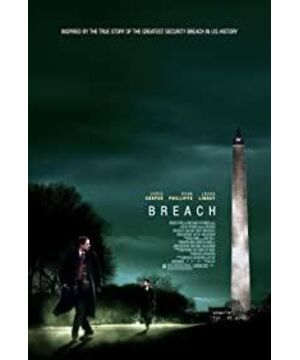Although there is no thrilling and swordsmanship that spy movies usually have, and there is no 007 type of handsome boys and beauties, the bland description is closer to reality, allowing the audience to feel a real spy. A spy is also a person, and being a person has two sides: a so-called "bad person" does not necessarily do bad things all his life. Therefore, the film clearly tells people that it is meaningless to discuss the reasons for "betrayal", because everyone's values are different. Just as after Hansen was arrested, when a senior FBI executive asked him why he was a traitor, Hansen did not answer directly, but gave a summary of the motives of the captured traitor: maybe for money, maybe to fool the people of the counterintelligence department. The pleasure it brings, and maybe even to point out the hidden dangers of national security (of course, there are also betrayals based on beliefs, such as the European and American spies who defected to the Soviet Union during the Cold War, which I helped him summarize), and finally the senior director of the FBI said that recognized. This is the invaluable part of the screenwriters of this film. They did not choose to judge the "betrayers" from a moral height, nor did they just snap their hats. Instead, they presented the "betrayers" as objectively as possible and let the audience dissect it by themselves. .
Overall, because it is based on a true story, it has high credibility, and the description of the life of a spy is more realistic than any spy-themed film, and the actors' performances are also excellent. The fly in the ointment is that it is a bit anticlimactic: the veteran agents are very strong at first, but they are easily caught in the end. Let's take a look at how powerful Hansen is: he has been working as a secret agent for more than 20 years and betrayed secrets for more than 10 years, but he is safe and sound; after being suspected, the FBI specially set up a detection team of more than 10 people, which lasted for 5 years, but achieved nothing; In the end, the director of the Bureau of Investigation personally took command, mobilized elites from all walks of life, and set up a detection team of 50 people, which cost a lot of manpower and material resources; due to Hansen's betrayal, 50 spies in the United States disappeared, and hundreds of millions of direct losses were lost; first Dismiss the rookie agent every day when he goes to work: use "four truths and one falsehood" to say five things about himself, the rookie said that he is not good at lying, Hansen told him that it was regarded as a lie in the game; Hansen left the office for a minute , and said to the rookie who stole into his office: "If you let me catch you in the office again, you won't be able to get away with it!"
Isn't it a bit bizarre that such a powerful veteran agent was easily arrested in the end? Although the film's explanation is that the rookie has gained Hansen's trust and let down his guard, this is a huge price for the risky spy agent who has always been cautious and retired in less than 2 months and has become aware of the surveillance. Evaluated? ? There are also loopholes in the film: First, the superior gave Cainiao a special pager, which should not even be known to his wife, but when the Hansen family went to visit his house, Cainiao explained that the pager was out of power when he came back. Know his pager number? Second, the rookie explained that he came back late because his mother was injured. Wouldn't a veteran agent find a chance to prove whether the rookie beside him was lying? The third is that he deliberately dumped the kettle and left Hansen away for the purpose of stealing information, but half an hour later when Hansen came back, the kettle was still on his desk and the rookie stayed in his office pretending to pray without suspicion? Fourth, Hansen has already suspected that his car has been installed with electronic equipment and made it clear in the letter to his partner that he has been suspected, but why should he take the risk in the end?
So I am skeptical about Hansen's self-introduction in the end. Maybe the declassified information of the FBI will give the public a real answer in N years. Hansen was arrested on Sunday, February 18, 2001. When the reporter interviewed the Russian intelligence authorities later, it was reasonable for the top person in charge to be skeptical: it is not impossible for the FBI to frame and trap! At the same time, he made a strong rebuttal to the so-called huge losses of the United States: the spies sold by Hansen included those sent by the United States and bought in Soviet Russia. In essence, it was only to reduce the harm to Soviet Russia! Where did America's loss come from?
Of course, as a film made by an American, it is understandable that the stance is biased towards the United States, but the ideology is not as strong as imagined. Relatively speaking, it is relatively neutral to interpret Hansen himself.
View more about Breach reviews











